
Full resolution (JPEG) - On this page / på denna sida - Läseboken - Stories of the Earlier History of England - 90. Alfred the Great - 91. Harold the Second, and William the Conqueror

<< prev. page << föreg. sida << >> nästa sida >> next page >>
Below is the raw OCR text
from the above scanned image.
Do you see an error? Proofread the page now!
Här nedan syns maskintolkade texten från faksimilbilden ovan.
Ser du något fel? Korrekturläs sidan nu!
This page has never been proofread. / Denna sida har aldrig korrekturlästs.
Läsebok. N:o 76 — 77. 96
have been patient, persevering, never to be broken in spirit,
never to be turned aside from enterprises on which they have
resolved. In Europe, Asia, Africa, America, the whole world
over; in the desert, in the forest, on the sea; scorched by a
burning sun, or frozen by ice that never melts; the Saxon blood
remains unchanged. Wheresoever that race goes, there, law,
and industry, and safety for life and prosperity, and all the
great results of steady perseverance, are certain to arise.
I pause to think with admiration of the noble king who,
in his single person, possessed all the Saxon virtues. Whom
misfortune could not subdue, whom prosperity could not spoil,
whose perseverance nothing could shake. Who was hopeful
in defeat, and generous in success. Who loved justice,
freedom, truth, and knowledge. Who, in his care to instruct his
people, probably did more to preserve the beautiful old Saxon
language, than I can imagine. Without whom, the English
tougue in which 1 tell this story might have wanted half its
meaning. As it is said that his spirit still inspires some of
OTir best English laws, so, let you and I pray that it may
animate our English hearts, at least to this — to resolve,
when we see any one of our fellow-creatures left in ignorance,
that we will do our best, while life is in us, to have them
taught; and to tell those rulers whose duty it is to teach,
and who neglect their duty, that they have profited very
little by all the years that have rolled away since the year
nine hundred and one, and that they are far behind the
bright example of King Alfred the Great.
d) 91. Harold the Second, and William the Conqueror.
Harold was crowned King of England on the very day
of the Confessor’s funeral. He had good need to be quick
about it. When the news reached Norman William, hunting
in his park at Rouen, he dropped his bow, returned to his
palace, called his nobles to council, and presently sent
ambassadors to Harold, calling on him to keep his oath and
resign the Crown. Harold would do no such thing. The
barons of France leagued together round Duke William for
the invasion of England. Duke William promised freely to
distribute English wealth and English lands among them.
The Pope sent to Normandy a consecrated banner, and a
ring containing a hair which he warranted to have grown on
the head of Saint Peter. He blessed the enterprise; and
cursed Harold; and requested that the Normans would pay
»Peters Pence» — or a tax to himself of a penny a year on
every house — a little more regularly in future, if they
could make it convenient.
<< prev. page << föreg. sida << >> nästa sida >> next page >>